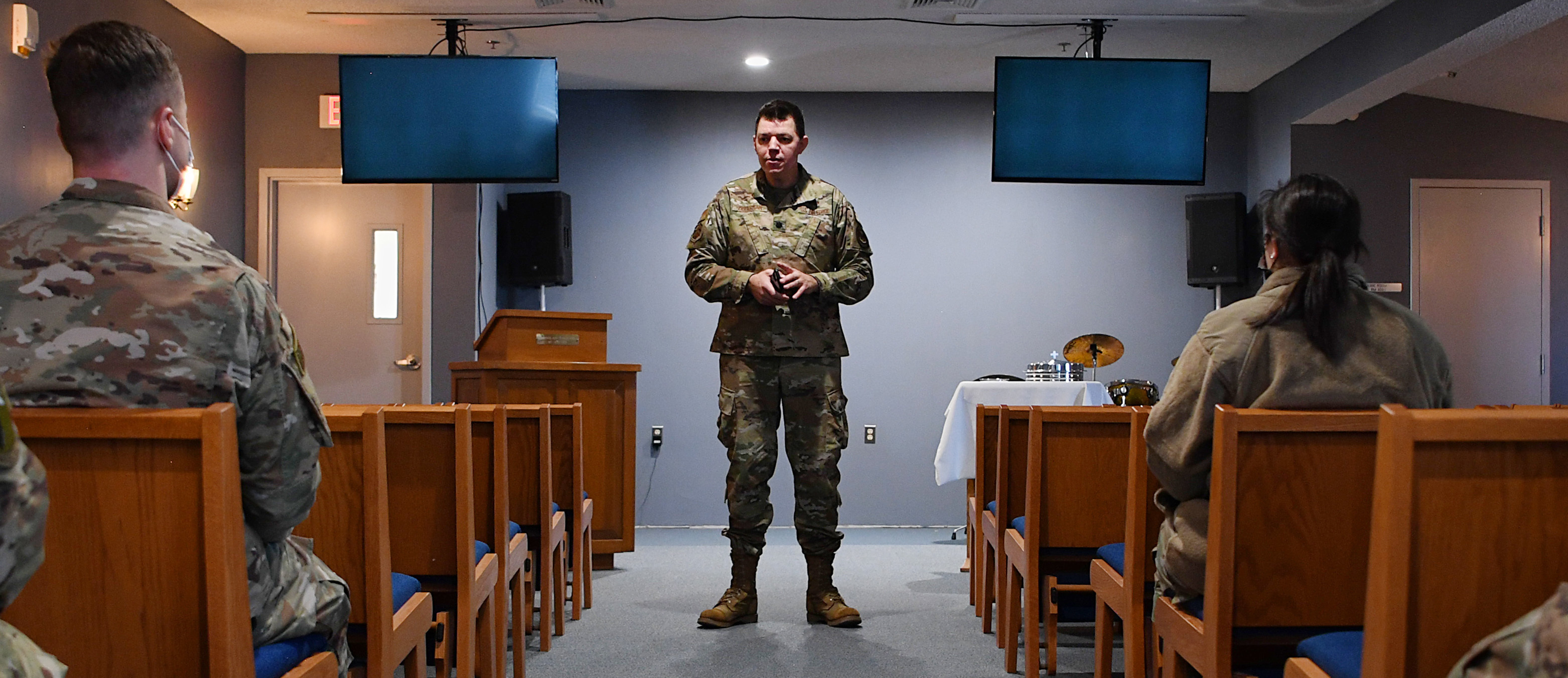17: The Military Chaplaincy
IN THIS CHAPTER
Our nation is blessed to have a military chaplaincy, and OCF wants its members to reach out to their chapel staff, build good relationships with them, and seek to bless the chaplain teams whenever possible. We are careful to say that we support the chaplaincy, but we do not ask members to support a particular chaplain or chapel program. Supporting the chaplaincy can be done whether the doctrine and theology of a particular chaplain or religious affairs professional are Christian or not, since they remain responsible for implementing the commander’s religious program.
Download the Handbook
Get a PDF of the entire OCF Handbook, including all chapters and appendices.
SUPPORT REGARDLESS OF RELIGIOUS AFFILIATION
When OCF says that we support the chaplaincy, we are making a statement about the critical nature of the free exercise of religion for the entire military community. Our nation assigns professionals to ensure religious accommodation without mandating denomination, creed, or spiritual allegiance. Since every chaplain is charged to advocate for free exercise of religion, leaders should seek out chaplains as advisors and counselors, especially in matters where there is an intersection of faith, family, and profession.
Leaders work hard to know their unit personnel, so what better person to consult than the chaplain, assuming the chaplain has the pulse of unit morale, installation stresses, and the effect of policies on force readiness?
Supporting the chaplaincy does not require a check to see if we agree theologically with our chaplains. We can hold fast to faith in Christ alone while simultaneously loving every chaplain. We care about them and their families, and we should care about them spiritually, personally, and professionally. You might be the only leader who makes an effort to see how your chaplain is doing.
It takes time to build relational trust, so make it a habit to stop in and see your chaplain(s). If you don’t know your chaplains, then they almost certainly don’t know you. Get to know as much of the chaplaincy staff as possible. Some chaplains will be gifted in trauma response, some in preaching, some in family counseling, some in listening. Learn from them—they will appreciate that you care.
GOOD COMMUNICATION IS ESSENTIAL
Tell the chapel staff about Bible studies, prayer groups, and fellowships in the local area so that they can point inquiring individuals in your direction. This helps them keep the commander informed on religious accommodation activities and prevents your chaplain from being surprised when they hear about a gathering.
It helps if you keep abreast of how laws and regulations are protecting or restricting free exercise of religion. Remember that, like you, chaplains are serving under the authority of a secular state, so if you learn to speak the language of chaplaincy regulations you can become a helpful partner to them in word and action. Uniquely, they must also be faithful to their endorsing body’s doctrinal requirements.
Ask your chaplain to explain what an endorsing body means to them. Endorsers approve and send pastors into the military, provide top cover through policy letters, and maintain the ministry credentials for uniformed service. Without these credentials, a chaplain is not allowed to remain in the military.
Consider how your professional role, spiritual giftings, or personal abilities might bless and extend the work of the chaplaincy. Help out where you can but realize that not every chaplain will be enthusiastic about parachurch participation. Some carry with them the pain of previously unhealthy parachurch experiences. The chapel staff should accommodate your OCF group in a manner similar to what they provide other religious groups.
PRACTICAL WAYS TO SUPPORT THE CHAPLAINCY
Pray for chaplains, their families, their staffs, and their congregations. Pray privately, as a family, and as an OCF group. This has the benefit of helping the OCF group get to know the chaplains better. If a chaplain team is connected to your unit, plan to hail and farewell them or find some way to appreciate them.
Many new chaplains come with extensive pastoral experience but have little military administrative experience. Some chaplains may ask for help navigating DoD’s promotions, assignments, awards, and decorations. Here are ideas for supporting your chaplain(s) and staff:
- Visit with them. Learn their names and stories … who are they? Speak words of encouragement, thanks, and if appropriate, ask to pray for them before you leave their office.
- Attend a chapel service or participate in a chapel program.
- Invite the chaplain to visit your unit. Be the escort, helping others to know who their chaplain is.
- Sit together during mandatory/highly encouraged functions so your chaplain (and spouse) doesn’t feel isolated, especially during unit social events.
- Invite chaplains to your home for dinner, to Bible study, prayer, etc. Invite them even if they never come.











